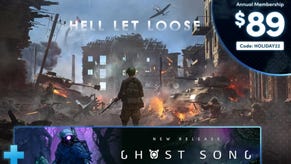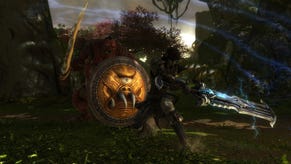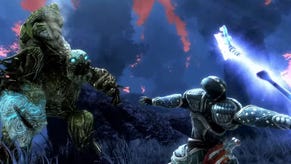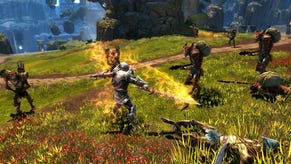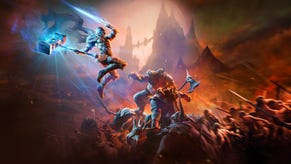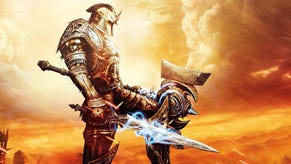The Day of Reckoning: BHG on Kingdoms of Amalur
Former baseball star creates fantasy RPG. Can it be good? Curt Schilling's Kingdoms of Amalur: Reckoning aims to try.
So a former baseball star, world-renowned fantasy author, iconic comic artist, and gaming industry demigod walk into a bar and... We forgot how the rest of that nugget of comedy gold goes, but we imagine it'd sound a lot like Kingdoms of Amalur: Reckoning. The brainchild of a hugely diverse brain clan that includes Curt Schilling, writer R.A. Salvatore, artist Todd McFarlane, and Morrowind and Oblivion lead Ken Rolston, Reckoning is poised to dodge cries of “just another fantasy RPG” - a magic missile-shaped target that seems to appear on the back of just about every aspiring swords 'n' sorcery behemoth these days. In response to such cynicism, however, general manager Sean Dunn presents a very simple philosophy: if it's good, it'll find an audience.
“You can look at all the current big names in the RPG space, and everyone started as an unknown IP,” he told VG247 during EA's GDC showcase event. “And really, the core essence of their success has been building an awesome RPG. Whether it's an open world RPG or a story driven RPG, it's been that execution – that commitment to a quality product. And that's what we're all about. The IP is a world for us to play in.”
“And really, the visionaries that we have working on the project – R.A. Salvatore, Todd McFarlane, and Ken Rolston – it's a place where they've been able to craft this world and give us all of this backstory, history, and future to pull from to build the essence of the world. It really allows us to ground the player within a space. So there's the ten thousand years of history that R.A. Salvatore built with the team, and we take place in just one portion of that history.”
The moment of reckoning
Big plans, big talk, big names. All great, sure, but what about the game itself? We were treated to an eyes-on (whatever that actually means – it sounds painful) demo of Reckoning, and we came away fairly impressed, if not a wee bit skeptical.
The game opens with your character awakening from a very specific sort of sleep. You know, the dead kind. You've been given a second lease on life by an old scientist who's been experimenting with something called the Well of Souls for years, and – wouldn't you know it – you're his first success story. And the others? Well, they became hideous, deranged cave monsters, which translates roughly to “combat tutorial” in badass fantasy hero-ese.
As soon as the main character started hacking and slashing, however, Reckoning stopped looking like a chip off The Elder Scrolls' block and transformed into the LARP-obsessed bastard child of God of War. Everything – from sword swings to massive, rock-shattering spells – looked equal parts big and stylish when viewed from the game's dynamic third-person perspective. In other words, as un-RPG-like as possible. Combat, however, was mapped to a single face button, with timing – and not the finger equivalent of Twister – deciding what sort of beatdown foes received. In spite of that dedication to crowd-pleasing choreography, though, Dunn assured us that Reckoning's still very deeply entrenched in its RPG roots.
"It's been that execution – that commitment to a quality product. And that's what we're all about."
“When you look at the combat, it's a very robust, almost fighting game-like system. There are parries, dodges, [and things of the like]. But at the core is RPG combat. So the stats of your character, the weapon that you have equipped, the armor, the bonuses apply, skills and traits that you've applied to your character through leveling up – that's a huge portion of your combat. That's going to dictate whether you win or lose more than your skill. You can't skill your way through the game without progressing through talents and progressing through loot,” he explained.
Character building, similarly, takes the Ye Olde Booke of Fantasy RPG Cliches and chucks it out Ye Olde Window, instead allowing you to invest in whatever skills you want. In other words, the game has no pre-defined classes. Want to pluck a skill from the big, burly “might” talent tree? Go ahead. Want to sweeten the pot with a little magic? Be our guest. It's all up to you, and the Reckoning team's aiming to create a system in which variety rules the day – not boring dedication to a single talent tree.
A whole new world
Reckoning's foundations are undeniably solid, but let's face it: most people don't play RPGs for the combat or the number-crunching. Those things – no matter how promising – are just gravy. The world and the story, meanwhile, are the creamy mashed potatoes in this mouth-watering analogy, and in that area, Reckoning raised more questions than it answered. On the upside, what we saw looked quite gorgeous, though nothing really popped out and took us by surprise. During the demo, we were shown a colossal, high-ceiling-ed cave, a forest that may well have contained every shade of green known to man – as well as a few new ones – a tiny rural village, and some crumbling stone ruins. The game's art style reminded us very much of a higher-fidelity, more detailed World of Warcraft. It still retained that cartoony slant, but we could definitely tell its console's innards weren't asleep on the job.
For all its size and majesty, however, Reckoning's world struck us as oddly empty and – at this point, anyway – somewhat lifeless as a result. It also didn't help that 38 Studios and Big Huge Games weren't talking story or character interaction just yet, though Dunn did note that it'll be “what you expect” from a game in this space. He was also a great deal more forthcoming with details about what was going on underneath the hood of the game's sleek, shiny exterior. For instance, “big” and “open” can mean a lot of things to a lot of people, but what's Reckoning's take?
“It's really big,” said Dunn. “It's really hard to put a square footage or anything like that on the world. It is an open world kind of in the frame of, like, an Oblivion. You can go just about anywhere. Also, there's the power of the player [to consider]. We don't auto-level the power of the world depending on the level of the player. You can get yourself into trouble by roaming into an area or a dungeon where stuff is just too powerful for you.”
“And the beauty of that is that you may get your ass kicked in a place, but you get to go build up your character and then return to exact retribution on the stuff that caused you problems. To feel powerful in a world, you have to also feel in danger, you know? So it's really important that we don't want to pigeonhole the player into playing this area and then this area and then this area. It is an open world, but there are places where the player can get themselves into trouble.”
"We don't just have guys sitting there waiting for 300 days for Joe Blow to come by and save his chickens."
Meanwhile, Dunn also attempted to allay our fears about Reckoning's apparently blank planet, saying that “NPCs definitely aren't static. You saw in the demo when we moved through a day-night cycle, characters have different ways that they move between towns. We also want to make sure, though, that quest-givers are always there. We're not talking a whole lot about that right now, but you can kind of see that – in the world – we don't just have guys sitting there waiting for 300 days for Joe Blow to come by and save his chickens. We try to make the whole place feel alive. It is open world, you know.”
On top of that, not all of the game's story is coming from desperately needy quest-givers. When you've got R.A. Salvatore spilling an entire universe from his brain onto a page, it's generally a good idea to stuff bits and pieces of story wherever they'll fit.
“When you come upon, say, some ruins in the world, they're not just there to look pretty. There's actual backstory on what those ruins were – the language they used, the markings they used, you know. There may be books in a nearby town that may be able to tell you about the history. There may be myths about that civilization that built those. So it's really important that it be grounded,” Dunn explained.
“That's really the purpose of building the IP. It's not just building an IP so we can sell stuff for it. It's like, you need to have a world that your RPG can live inside of. Just like the Elder Scrolls series, or Dragon Age, or Mass Effect, they all started as original IPs and came to fruition because of really high quality execution.”
Fantasy fatigue
Granted, even the most detailed, imaginative world ever conceived won't do you a lick of good if everyone just judges your book by its cover and uses its pages to line their cat's litter box. Dunn, however, doesn't think the situation for fantasy – which has lost its place as the sexy, young arm candy to pop culture's evergreen movie star – is as dire as many people are making it out to be.
“I think those can be trends,” he told us. “You know, the industry can support those trends and still support that core idea. Lord of the Rings wasn't something new when the movies came out. When you execute on the core fantasy of a world well, I think it's compelling no matter what – whether it's fantasy or sci-fi or modern day. It's about that core execution, and it brings palatable story and palatable content. Really, you're here to save the world. It's about building a world that's worth saving - whether that's in the future or in the past or in some fantasy world.”
"It's about building a world that's worth saving - whether that's in the future or in the past or in some fantasy world.”
“I think Dungeons and Dragons is a great example. It's something that's been around for who knows how many years, but it's still [around] and has its moments of popularity. When you have moments of great execution of story in fantasy worlds – whether it's George R. R. Martin or whether it's R.A. Salvatore – they're multiple time best-sellers in fantasy novels, and their numbers aren't dropping. They're still very relevant. And using Salvatore to craft this world, we're still pretty sure that the relevance of the world is still there. It's not just generic fantasy. It's not just orcs and elves. It's the R.A. Salvatore take on that world.”
Sky's the limit
No matter how far Reckoning strays from generic fantasy conventions, however, comparisons between it and Bethesda's upcoming 800 lb three-eyed gorilla monster The Elder Scrolls V: Skyrim are inevitable. And with Skyrim launching at the tail end of 2011 and Reckoning reckoning it'll hit shelves sometime in 2012, the two might be battling for more than just bragging rights. Dunn's response? “Bring it on.”
“I think our attitude is more of a 'bring it on' type of thing. I mean, we love it when there are successful RPGs. The more great RPGs there are, the bigger the genre grows, and the more people there are that play these games. They approach the game the way that they want to and they've been doing open world games for a long time. We have a lot of people from their previous teams, but we're also doing our own take on open world RPGs,” he said.
“You know, combat's a thing that's really important to hit in that real-time way that we have. The look and feel of the world is totally different than Skyrim's. The way that we approach characters and story and things like that [is also very different]. So we think there's space for everybody to play in. If you make an awesome, high-quality, open world RPG, we think people will buy it.”
Well then, Sean, you follow through on that first part, and we'll take care of the rest.


